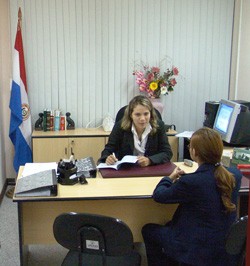
Father Juan de la Vega is a senior Roman Catholic priest, strongly committed to the promotion of human rights, and a highly respected ethics professor at a prestigious local university. Recently, a well-known civil and commercial judge obtained her doctorate in juridical science with a thesis on judicial ethics allegedly plagiarizing several scholars, including de la Vega’s publications.
Paraguay has long been challenged to create a judiciary independent from the political influences of members of government, citizens, or firms. Judicial ethics is one tool to address problems related to improper behavior, especially by judges.
Under an agreement with the Paraguayan Supreme Court, USAID provided assistance in developing a judicial Ethics Code through a participatory process, in which judges, bar associations, law schools, and civil society organizations were consulted nationwide. The Supreme Court later approved the Code, which has since been in force. USAID also financed an Ethics Office with office space, equipment, and a staff.
Since the Code went into full operation, 550 judges have suspended their affiliation with political parties, and the Ethics Tribunal has ruled in more than 26 cases regarding allegations of Code violations and submitted reprimand letters that are included in personnel files. In one unprecedented ruling that received broad press coverage and public attention, the Ethics Tribunal sanctioned three Supreme Court justices for violating articles of the Ethics Code that prohibit judges and other magistrates from participating in political activities.
In the case involving plagiarizing of de la Vega’s work, the Ethics Office found that the accused judge plagiarized more than 15 studies and publications on ethics. As a result, the Ethics Tribunal sanctioned the judge with a strong admonition. In addition, thanks to de la Vega’s determination, and the Ethics Office’s sound investigative work, this judge was criminally indicted, in a case that received broad media coverage and generated a wide public discussion on judiciary ethics.







Comment
Make a general inquiry or suggest an improvement.